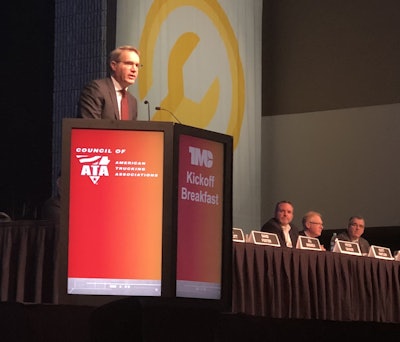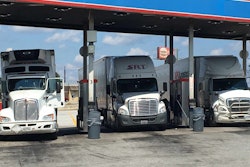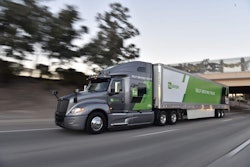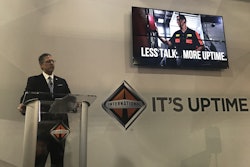 ATA President and CEO Chris Spear addresses TMC members at the council’s 2019 annual meeting.
ATA President and CEO Chris Spear addresses TMC members at the council’s 2019 annual meeting.During an address at the American Trucking Associations’ Technology & Maintenance Council 2019 Annual Meeting in Atlanta, Chris Spear, ATA president and CEO lauded the council’s role in helping shape ATA’s advocacy efforts and discussed the importance of infrastructure funding and workforce development.
“The standards and protocols produced here transform into message plates that we take to Capitol Hill, into the agencies and into state capitals,” said Spear. “They drive outcomes, whether they be safety protocols, autonomous vehicle and driver assist technologies, cybersecurity or power management. These are all things that make our equipment safer, more productive and environmentally friendly. You are the backbone to making that happen.”
Citing 2019 as a promising year for positive outcomes for the trucking industry, Spear called for support of the White House administration’s trillion-dollar, 10-year infrastructure plan and highlighted a road he regularly travels in the D.C. area as an example of why legislation is so important.
“There are roads in Syria that are better-paved than the George Washington Parkway,” he said. “The policy of the National Park Service – a federal agency – is to lower the speed limit so people driving on the parkway have more time to avoid the potholes. That’s the solution?… That has to be the dumbest policy I’ve ever heard.”
Spear is optimistic on bipartisan legislation expected to take shape in the next four to eight weeks that could generate a bill in the House of Congress in June and in the Senate by July.
“This could be historic, and if properly funded with real money we could see new efficiencies, the elimination of bottlenecks and congestion where we lose $74.5 billion per year sitting in traffic, 425,000 drivers sitting idle for an entire year,” said Spear. “The damage our equipment endures simply because of our infrastructure is something you are all too familiar with. Good infrastructure is an investment in our nation’s future.”
Spear also touched on the importance of effective trade policy for the North American trucking industry. “When you are moving 76 percent of NAFTA surface freight, our ability to move to the United States-Mexico-Canada Agreement will be paramount to ensure out industry has the ability to grow, and coupled with infrastructure, the future is bright and allows us to focus our industry to growing our workforce,” he said.
In addition to highlighting the need to allow 18- to 21-year-olds to drive commercial vehicles across state lines and citing promising bipartisan legislation in both chambers that would allow it, Spear said urban hiring is another area for future workforce development. ATA recently invested into a grant in the City of Baltimore to better understand the dynamics of urban workers.
“Minorites such as African-Americans, Hispanics and women – we need to go further than we have before and understanding those demographics will be key in helping our companies and our members acquire that talent,” said Spear, adding health and wellness programs are essential to sustaining the industry’s existing workforce.
“This is a culmination of things we need to do to grow our industry as a whole,” said Spear. “It’s not just one thing, its many things, and we need to begin doing it now. Not just talking about the problem but acting on it.”











